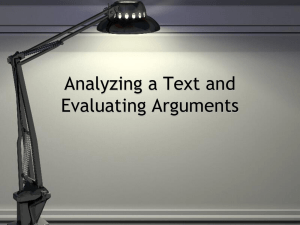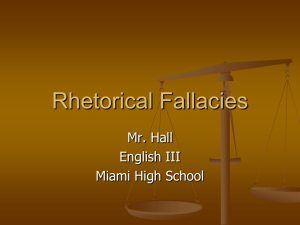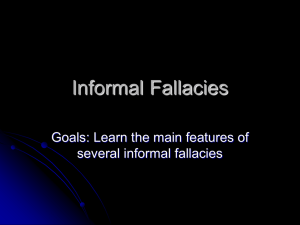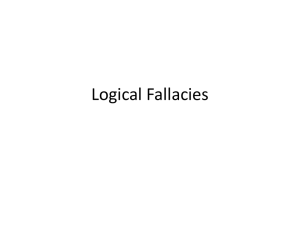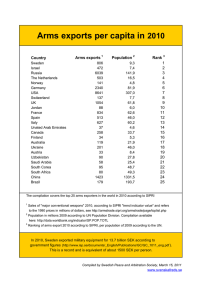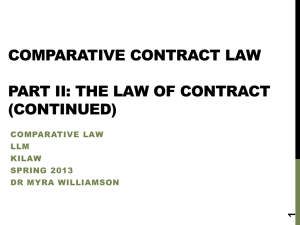Fallacies: Presumption
advertisement
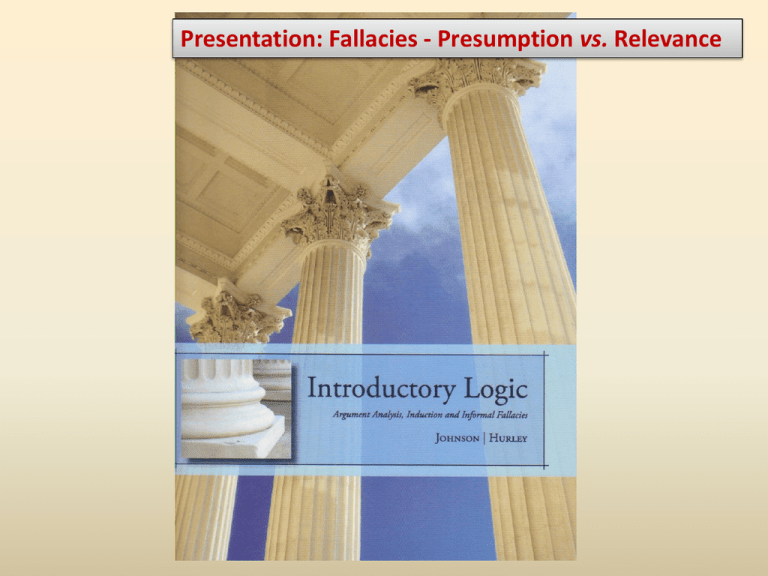
Presentation: Fallacies - Presumption vs. Relevance Homework • Reading: pp. 145-152 The Study Guide is available online • Recommended Exercises (do at least the starred problems) – 4.3.III (of relevance & weak induction) – 4.4.I (of presumption & ambiguity) – 4.4.III: 1-50 Model exercise for the exam Remember How does each specific argument commit a fallacy of that type? • Where precisely is the offending element in the argument? Kinds of Informal Fallacies Fallacies of: 1. 2. 3. 4. Relevance Weak Induction Presumption Ambiguity or Whole/Part a. b. Ambiguity Whole/Part • Where premises do support the conclusion – Insufficient evidence to warrant conclusion • • Conclusion unlikely Fallacies of induction Kinds of Informal Fallacies Fallacies of: 1. 2. 3. 4. • Premises are logically immaterial to conclusion Relevance Weak Induction • Attention drawn away from supporting evidence Presumption – appeal to some irrelevant Ambiguity or Whole/Part a. b. Ambiguity Whole/Part concern – often intentionally deceptive • Premises appear relevant Kinds of Informal Fallacies Fallacies of: 1. 2. 3. 4. Relevance Weak Induction Presumption Ambiguity or Whole/Part a. b. Ambiguity Whole/Part • Premises reiterate or presuppose conclusion – Simple or deceptive – May also presume what needs proving Fallacies of Presumption 1. Begging the Question 2. Complex Question Formally, identical to valid arguments 3. Either … or … (false dichotomy) 4. Suppressed Evidence Fallacies of Presumption • Begging the Question 1. Conclusion is restatement of some premise • Simple: In same words • Complex: In different words of same meaning • Deceptive: Key premise missing but asserted as premise 2. Circular argument • Premises presuppose conclusion which, itself, presupposes premises Fallacies of Presumption P⊢P 1 (1) P A Fallacies of Presumption • BQ (restatement) – We have a brain in our skulls but no mind. The mind is a myth, since the mind is just a fairy tale we tell ourselves to believe in life after death. A myth and a fairy tale are one and the same thing Shaky premise Fallacies of Presumption • Circular Reasoning To cast abortion as a solely private moral question…is to lose touch with common sense: How human beings treat one another is practically the definition of a public moral matter. Of course, there are many private aspects of human relations, but the question whether one human being should be allowed fatally to harm another is not one of them. Abortion is an inescapably public matter. Source: Helen M. Alvaré, The Abortion Controversy, Greenhaven, 1995, p. 23. (http://www.fallacyfiles.org/begquest.html) Fallacies of Presumption • Circular Reasoning To cast abortion as a solely private moral question…is to lose touch with common sense: How human beings treat one another is practically the definition of a public moral matter. Of course, there are many private aspects of human relations, but the question whether one human being should be allowed fatally to harm another is not one of them. Abortion is an inescapably public matter. Source: Helen M. Alvaré, The Abortion Controversy, Greenhaven, 1995, p. 23. (http://www.fallacyfiles.org/begquest.html) Fallacies of Presumption • Circular Reasoning To cast abortion as a solely private moral question…is to lose touch with common sense: How human beings treat one another is practically the definition of a public moral matter. Of course, there are many private aspects of human relations, but the question whether one human being should be allowed fatally to harm another is not one of them. Abortion is an inescapably public matter. Source: Helen M. Alvaré, The Abortion Controversy, Greenhaven, 1995, p. 23. (http://www.fallacyfiles.org/begquest.html) Fallacies of Presumption • Circular Reasoning To cast abortion as a solely private moral question…is to is a public matter. lose touchAbortion with common sense: How human beings treat one another is practically the definition of a public moral Why? matter. Of course, there are many private aspects of human relations, but the question whether one human Abortion is a notfatally a private matter. being should be allowed to harm another is not one of them. Abortion is an inescapably public matter. Source: Helen M. Alvaré, The Abortion Controversy, Greenhaven, 1995, p. 23. (http://www.fallacyfiles.org/begquest.html) Fallacies of Presumption • “Either … or …” fallacy – You should just drop out of school. Either take a full course load or drop out. And with everything going on right now you can’t take a full course load. PvQ, ~P ⊢ Q 1 (1) P v Q A 2 (2) ~P A Standard Features: 1,2 (3) Q 1,2 vE 1. Express disjunction 2. Reasonable alternatives ignored or suppressed Fallacies of Presumption • Complex Question – After J. Gordon Liddy served time in prison for his role in the Watergate scandal that brought down President Nixon, he made an appearance on the Dick Cavett show. On the show, Cavett mentioned the high rate of homosexual activity in US prisons. Cavett: “Did you have any trouble adjusting to homosexuality in prison?” Liddy: “No.” Cavett: “There you have it folks. Mr. Liddy had no trouble adjusting to homosexuality in prison.” The two questions in one: 1. Did you adjust to a homosexual lifestyle in prison? 2. Was it difficult? Fallacies of Presumption • Suppressed Evidence – Cough syrup is an effective remedy for adults suffering from common respiratory distress. Kids will benefit as equally. Recognition of suppressed evidence can be challenging? 1. Obvious instances are, of course, simple to identify 2. More difficult cases: background knowledge often necessary Fallacies of Presumption "The Second Amendment to the Constitution states that the right of the people to keep and bear arms shall not be infringed. But a law controlling handguns would infringe the right to keep and bear arms. Therefore, a law controlling handguns would be unconstitutional. "In fact, the Second Amendment reads, "A well regulated militia being necessary to the security of a free state, the right of the people to keep and bear arms shall not be infringed." In other words, the amendment states that the right to bear arms shall not be infringed when the arms are necessary for the preservation of a wellregulated militia. Because a law controlling handguns (pistols) would have little effect on the preservation of a well-regulated militia, it is unlikely that such a law would be unconstitutional. (p. 146 of our text) Fallacies of Presumption "The Second Amendment to the Constitution states that the right of the people to keep and bear arms shall not be infringed. But a law controlling handguns would infringe the right to keep and bear arms. Therefore, a law controlling handguns would be unconstitutional. "In fact, the Second Amendment reads, "A well regulated militia being necessary to the security of a free state, the right of the people to keep and bear arms shall not be infringed." In other words, the amendment states that the right to bear arms shall not be infringed when the arms are necessary for the preservation of a wellregulated militia. Because a law controlling handguns (pistols) would have little effect on the preservation of a well-regulated militia, it is unlikely that such a law would be unconstitutional. (p. 144 of our text) Fallacies of Presumption "The Second Amendment to the Constitution states that the right of the people to keep and bear arms shall not be infringed. But a law "The Supreme Court, splitting along controlling handguns would infringe the right to keep and bear ideological lines, onhandguns June 26would <2008> arms. Therefore, a law controlling be unconstitutional. declared the District of Columbia's ban on handgun "In fact, the Second Amendment reads, ownership "A well regulated militia being necessary to the security of a free(Washington state, the right of the people to unconstitutional." Post) http://www.washingtonpost.com/wp-dyn/content/story/2008/06/23/ST2008062300649.html?hpid=topnews keep and bear arms shall not be infringed." In other words, the amendment states that the right to bear arms shall not be infringed when the arms are necessary for the preservation of a wellregulated militia. Because a law controlling handguns (pistols) would have little effect on the preservation of a well-regulated militia, it is unlikely that such a law would be unconstitutional. (p. 144 of our text) Homework • Reading: pp. 145-152 The Study Guide is available online • Recommended Exercises (do at least the starred problems) – 4.3.III (of relevance & weak induction) – 4.4.I (of presumption & ambiguity) – 4.4.III: 1-50 Model exercise for the exam Remember How does each specific argument commit a fallacy of that type? • Where precisely is the offending element in the argument?
